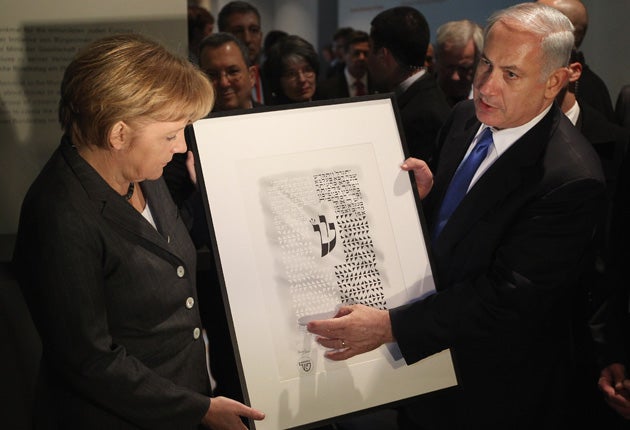Israel in historic meeting to mark Holocaust

Your support helps us to tell the story
From reproductive rights to climate change to Big Tech, The Independent is on the ground when the story is developing. Whether it's investigating the financials of Elon Musk's pro-Trump PAC or producing our latest documentary, 'The A Word', which shines a light on the American women fighting for reproductive rights, we know how important it is to parse out the facts from the messaging.
At such a critical moment in US history, we need reporters on the ground. Your donation allows us to keep sending journalists to speak to both sides of the story.
The Independent is trusted by Americans across the entire political spectrum. And unlike many other quality news outlets, we choose not to lock Americans out of our reporting and analysis with paywalls. We believe quality journalism should be available to everyone, paid for by those who can afford it.
Your support makes all the difference.Israel's cabinet has convened for the first time in Berlin, in a joint meeting with the German cabinet to symbolise the nations' strong bond 60 years after the Holocaust.
The focus, though, was not on threats gone by but on one that may loom in the future — the possibility of a nuclear-armed Iran.
After the joint session, Israeli Prime Minister Benjamin Netanyahu and German Chancellor Angela Merkel warned that Iran will face new sanctions if it doesn't change course on its nuclear program.
Netanyahu used the occasion to highlight the gravity of the Iranian threat.
"We know from recent history that a regime that tyrannizes its own people will tyrannize the world," he said.
Germany's efforts to curb Iran's nuclear ambitions figured high on the agenda, and Merkel said her country would back tougher sanctions against Iran if it did not curtail its nuclear program.
"If Iran's reactions don't change, we will help work on comprehensive sanctions," Merkel said.
Germany has long been part of the group of nations seeking to address concerns over Iran's nuclear ambitions, which Israel and most of the West believe is meant to develop weapons. Israel considers a nuclear Iran a threat to its existence and has hinted it might attack Iran if international diplomacy fails.
Netanyahu pressed hard for sanctions, saying the time has come to confront Iran's Islamic regime.
"If we don't apply sanctions, crippling sanctions, against this Iranian tyranny, when shall we apply them?" he asked. "If not now, when?"
A high-ranking Israeli defense official, speaking on condition of anonymity because the talks are in early stages, said Jerusalem has recently begun discussing the possibility of acquiring a sixth submarine built by Germany. It already has three, and two more are under construction. Israel is also interested in German-made Meko-a 100 warships. Israeli officials were expected to ask about purchasing technology used on these ships. Israel would then manufacture its own ship with the technology, the official said.
Environmental issues, economic cooperation and efforts to restart the Middle East peace process were also discussed during the one-day visit by Netanyahu and six of his ministers — including his defense and foreign ministers.
The trip was originally scheduled for late November, but was put off at the last moment when Netanyahu fell ill with a viral infection.
The Cabinet meeting began after a joint visit to Berlin's Holocaust memorial, which consists of a field of 2,711 gray slabs that serve as a tribute to the Holocaust's 6 million Jewish victims.
Netanyahu signed the memorial's guest book with thanks for the "invaluable preservation of the Holocaust."
Israel was established three years after the end of World War II. Since then, Germany has paid $39.4 billion in compensation to Holocaust survivors in Israel, 250,000 of whom are still alive.
Since the two countries established diplomatic ties in 1965, Germany has become perhaps Israel's strongest ally in Europe.
"Germany faces, without flinching for a second, the darkest chapters of its past it order to build a brighter future for its people and for the world," Netanyahu said. "It is something we deeply appreciate, something that has momentous historic significance."
Yesterday's session followed a historic visit in March 2008 by German Chancellor Angela Merkel and her Cabinet to mark the 60th anniversary of Israel's independence. During that three-day visit, Merkel addressed the Israeli parliament in German, and expressed shame over the Holocaust. The 20-minute speech earned Merkel a standing ovation.
Israeli and German governments plan to hold joint Cabinet sessions once a year in the future. Germany has such arrangements with five other nations.
Join our commenting forum
Join thought-provoking conversations, follow other Independent readers and see their replies
Comments